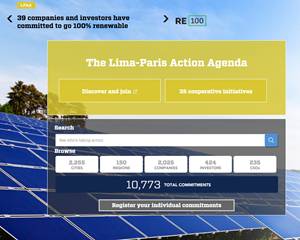
Source: Fundacion AVINA
10.500 commitments by non-state actors to reduce climate change would precede COP21
After 20 years of negotiations, it is expected to complete the first agreement on climate change which demands all state-members to undertake long-term activities during the 21st edition of the Conference of Parties of the United Nations Framework Convention on Climate Change that will take place next week in Paris at the COP21.
NEW YORK, Nov. 27, 2015 (GLOBE NEWSWIRE) -- Thousands of commitments to climate action that were registered through NAZCA (portal launched in 2014 by the Peruvian Presidency at the COP20), would complete their implementation by 2020, reducing the emissions gap to 2°C even before the new agreement comes into effect.
After 20 years of negotiations, it is expected to complete the first agreement on climate change which demands all state-members to undertake long-term activities during the 21st edition of the Conference of Parties of the United Nations Framework Convention on Climate Change that will take place next week in Paris at the COP21.
It is clear that the success of this transition not only depends on national governments but also on the articulated actions of all sectors and levels of society – the "non-state actors", thus considered under the Convention on Climate Change. They are private companies, civil society organizations, indigenous peoples and sub-national governments that add thousands of high level commitments to the climate action agenda, consolidating themselves as stakeholders that are essential to the success of this agenda. Within this context, Fundación Avina will launch the ACTIONLAC PLATAFORM at COP21 to promote the commitments of non-state actors in Latin America and the support from potential funders.
Based on those inputs it is expected to drive national states to assume even more ambitious commitments to complement their Intended Nationally Determined Contributions (INDC). Under the Convention, cooperative climate action initiatives among states, subnational governments and non-state actors are no substituted by the responsibilities of national states, but complemented with value added instead.
The non-state actors and subnational governments commitments are considered to be one of the four pillars for success in Paris – along with all the INDCs; the global agreement and the development of a climate financing package, by the Governments of France and Peru (through the Lima-Paris Action Agenda, LPAA); the United Nations Secretary General; and the Climate Change Convention Secretariat.
There are good experiences in Latin America of joint works between states and non-states actors that are generating consistent and long-term effects of climate change, driving low-emission and climate-resilient development models.
During 2015, a series of initiatives has been establishing their own climate change frameworks to be brought to Paris as part of the commitments to COP21. One of this initiative is the Statement on Access to Water, a platform that adds commitments of community water organizations, civil society organizations and government bodies to develop concrete actions until 2030 to reduce water vulnerability. Another one, is the Statement of Latin American Municipalities to COP21, which is a statement by municipal governments of Argentina, Guatemala and Peru which are committed to "intensify actions for a low-emission, climate-resilient future, developing partnerships, establishing tangible goals, implementing and monitoring climate change mitigation and adaptation actions". Over the next weeks, the Platform for Sustainable Energies and Equity (PLESE, in its Spanish acronym) will also refine its goals as part of the contribution of civic social organizations to the global climate action. All those initiatives are also linked to the achievements of the Sustainable Development Goals (SDG), recently launched by United Nations.
ActionLAC: From commitment to action
This emerging movement of commitments to climate action will have to demonstrate its capacity for action in order to ensure credibility and recognition. The ActionLAC Platform, designed and created by Fundación Avina, aims to support that process. It is due to start early in 2016.
ActionLAC will unite climate action commitments of different Latin American non-state actors and potential funders. Besides, it will support the implementation with transparency and the commitment to sharing knowledge and lessons learned. The expected outcome is the strengthening of a development that is resilient to climate change.
Organizations will receive advice and assistance to carry out their commitments and report progress towards their goals. Those impacts will be visible outside the region.
This platform seeks to reflect the impact of all these efforts and actions in a cross-cutting manner across different Sustainable Development Goals.
Press Contact
Pablo Baños
pablo.banos@avina.net
comunicaciones@avina.net
More Information: http://www.avina.net/
A photo accompanying this release is available at:
http://www.globenewswire.com/newsroom/prs/?pkgid=37861
